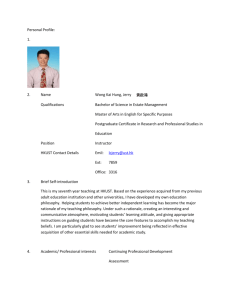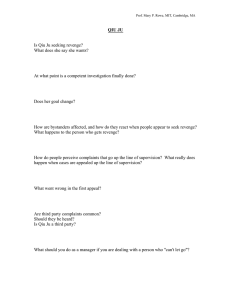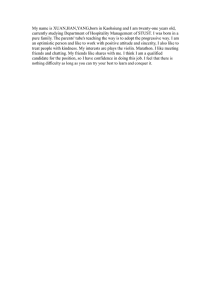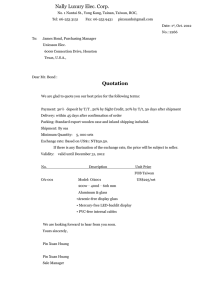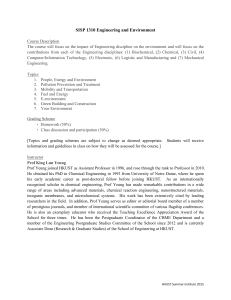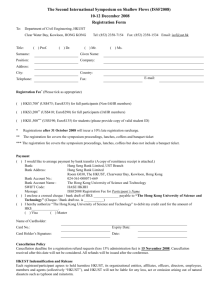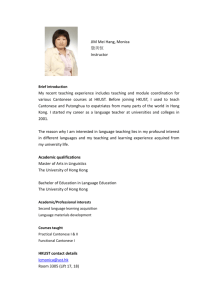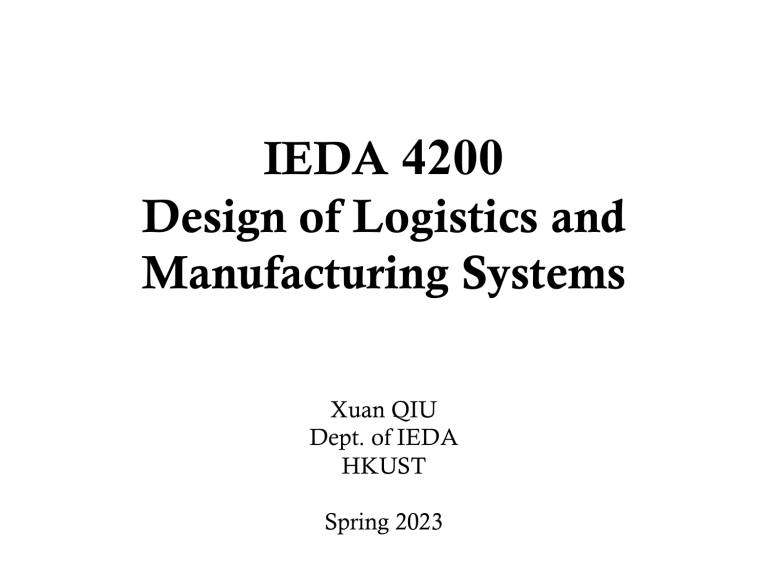
IEDA 4200 Design of Logistics and Manufacturing Systems Xuan QIU Dept. of IEDA HKUST Spring 2023 Instructor’s Information • Instructor: Xuan QIU • Contact Information: – Room 5549 – E-mail: xuanqiu@ust.hk • Office Hour: – 2-3pm, Tuesday IEDA4200, Xuan QIU (HKUST) 2 TA’s Information • Ms. HE Yihua – Email: yyanaz@connect.ust.hk – Room 5568 IEDA4200, Xuan QIU (HKUST) 3 Course Description • This course is designed to provide some fundamental concepts, theories and procedures for the study of facility location, process and material flow analysis, physical layouts, computerized layout planning, and warehouse operations. • Lecture notes are uploaded to canvas (http://canvas.ust.hk). IEDA4200, Xuan QIU (HKUST) 4 Textbook Tompkins, J.A., White, J.A., Bozer, Y.A., Tanchoco, M.A. (2010). Facilities Planning (4th Ed). Hoboken, NJ: John Wiley and Sons, Inc. We will move around the text according to the tentative course plan IEDA4200, Xuan QIU (HKUST) 5 Grading Criteria • Homework + Lab reports 15% (No late homework is accepted. Please submit through canvas) • • • • Project Participation (small Quiz) Mid-Term Exam (23 Mar. 2023) Final Exam 15% 5% 25% 40% • Both mid-term and final exams are closed book and closed notes IEDA4200, Xuan QIU (HKUST) 6 Course Requirements • Lab – 1:30 – 2:20pm, Room 3207 – 14, 21, 28 Feb., 7 Mar., 4 &18 April 2023 (6 lab sessions, the schedule is subject to change at the instructor’s discretion) – Lab reports due at the end of the lab. Late reports are not accepted. • Project – Find a layout that can be improved in your daily life and redesign it – Grouping due (3-4 members): 2 Mar. 2023 – Presentation dates: 2, 4 & 9 May 2023 – Final report & PowerPoint due: 9 May 2023 IEDA4200, Xuan QIU (HKUST) 7 Course Outline 1. 2. 3. 4. 5. 6. 7. Introduction to Facilities Planning Facility Location Models Machine Layout and Group Technology Flow and Activity Relationship Analysis Layout Design Warehouse Operations and Warehouse Layout Product, Process, and Schedule Design IEDA4200, Xuan QIU (HKUST) 8 IEDA 4200 Design of Logistics and Manufacturing Systems Introduction to Facilities Planning IEDA4200, Xuan QIU (HKUST) What is a “Facility”? IEDA4200, Xuan QIU (HKUST) 10 Facilities • Facilities: – Fixed assets like building structures and inanimate resources that support the operations of a given activity – Facilities put together with humans, $, and/or materials, energy result in the activity • Facilities are used to… – – – – Hold finished products and ship to customers (DC) Manufacture products (manufacturing plant) Display and sell products to customers (retail) Provide healthcare services • Clinic • Hospital • Vaccination center IEDA4200, Xuan QIU (HKUST) 11 Facilities Planning • Facilities Planning involves – determination of how an activity’s tangible fixed assets best support achieving the activity’s objectives. • Disciplines involved: – Civil engineering; electrical/mechanical engineering; architectural; real estate; urban planning; industrial engineering • Industrial engineers focus on requirements, resource allocation, and efficient use of resources – Space requirements – Personnel requirements – System design/layout – Movement within a facility – Movement between facilities…… IEDA4200, Xuan QIU (HKUST) 12 Applications of Facilities Planning • Facilities planning can be applied to planning of – A new hospital – An assembly department – An existing warehouse – The baggage department in an airport – Academic buildings in universities – A production plant – A retail store – A dormitory – A bank – An office – A cinema – A parking lot – Or any portion of these activities etc… IEDA4200, Xuan QIU (HKUST) 13 Why Plan Facilities? • • • • • • • Expanding production, based on increased demand Entering a new field Introduction of new products/services Replacing an obsolete or inadequate facility Reallocating or consolidating production facilities Improving service to market(s) Changes in other resources (e.g. labor, subcontracted companies, political / environmental environment) IEDA4200, Xuan QIU (HKUST) 14 Significance of Facilities Planning • Cost of design changes during a project IEDA4200, Xuan QIU (HKUST) 15 Significance of Facilities Planning • Large investment is involved. – Majority of an organization’s capital investment is in facilities – 8% of GNP spent annually of facilities • Large impact on production cost – 20-50% of the total operating cost of a finish product is material handling cost. – Better designs of products and material handling systems can reduce at least 10-30% of the total material handling cost. • Safety and health – Eliminate or minimize possible hazardous conditions – Influence worker morale • Energy and environment concern IEDA4200, Xuan QIU (HKUST) 16 Facilities Planning Objectives • Improve customer satisfaction (e.g. maximize speed for quick customer response) • Maximize inventory turnover • Reduce costs (e.g. transportation cost, inventory carrying cost, packaging cost…) • Effectively utilize people, equipment, space, and energy • Be adaptable and promote ease of maintenance • Provide employee safety, job satisfaction, energy efficiency, and environmental responsibility • Assure sustainability and resilience IEDA4200, Xuan QIU (HKUST) 17 Facilities Planning Hierarchy Facilities Planning Facilities Location Facilities Design Facility System Design IEDA4200, Xuan QIU (HKUST) Layout Design Material Handling System Design 18 Facilities Planning in Different Sectors Manufacturing facilities planning Plant location Plant facility system Plant design Plant layout Material handling Office facilities planning Office location Office facility system Office design Office layout Information handling IEDA4200, Xuan QIU (HKUST) 19 Facilities Planning in Different Sectors Hospital facilities planning Emergency facilities planning IEDA4200, Xuan QIU (HKUST) Hospital location Hospital design Emergency room location Emergency room design Hospital facility system Hospital layout Patient handling Personnel handling Public handling Information handling Material handling Emergency facility system Emergency room layout Patient handling Personnel handling Information handling Material handling 20 Facility Location • The placement of the facilities with respect to customers, suppliers, other facilities, and etc. • Different levels of facility location decisions Site decisions Country decisions Region decisions What factors have to be considered in making facility location decisions? IEDA4200, Xuan QIU (HKUST) 21 Facility Location • Questions to be answered: – How many facilities to locate? – Where to locate? – How should demand be allocated to the facilities? China Mainland New Territories Tai Po Yuen Long Tuen Mun Central city area Tsuan Wan Sha Tin 5 Chek Lap Kok Tsing Yi 4 3 Kowloon 0 2 1 Tsing-Ma Bridge Lantau Island IEDA4200, Xuan QIU (HKUST) Hong Kong Island 0 1 2 3 4 5 Kai Tak airport Kwun Tong Kowloon Bay Tokwawan Cheung Sha Wan Kwai Chung 22 Facility Systems Design • Facility systems: – structural systems, enclosure systems, atmospheric systems, electrical and lighting systems, communication system, life safety systems, sanitation system…… • Objectives: – Understand of various systems elements within the facility – Overview of how the systems elements impact the overall process of facilities planning • What systems are required? • Where they are required? • Integrating the system into the overall facility IEDA4200, Xuan QIU (HKUST) 23 Facility Layout Design IEDA4200, Xuan QIU (HKUST) 24 Facility Layout Design • The layout problem is to arrange physical spaces required for several departments in a given space provided for the departments Department name 1. Receiving 2. Milling 3. Press 4. Screw m/c 5. Assembly 6. Plating 7. Shipping Dept 1 2 3 4 5 6 7 1 - 2 45 20 5 Size (ft2) 12,000 8,000 6,000 12,000 8,000 12,000 12,000 Flow 3 4 5 15 25 10 30 25 5 - 35 25 IEDA4200, Xuan QIU (HKUST) 6 5 15 10 7 65 - 35 65 - 25 Material Handling System • Material handling – Art and science of moving, sorting, protecting, controlling material – Moving the right amount of material, in the right condition, space, position, sequence, cost, methods • Material handling represent 15-70% of the total cost of a manufactured product. • In a typical factory, material handling accounts for – 25% of the workforce – 55% of the factory space – 87% of the production time IEDA4200, Xuan QIU (HKUST) 26 Material Handling System • Material handling activities – Transportation, receiving, storage, retrieval, packaging and shipping, postal system, personnel transit system. • Goals of material handling: – Reduce unit costs of production – Maintain or improve product quality, reduce damages, and provide for protection of materials – Promote safety and improve working conditions – Promote productivity – Control inventory IEDA4200, Xuan QIU (HKUST) 27 Material Handling System Equation • Materials + Moves + Methods = Preferred system necessary IEDA4200, Xuan QIU (HKUST) 28 Facility Planning Process • Facilities planning as continuous activity IEDA4200, Xuan QIU (HKUST) 29 Facilities Planning Process • Comparison of the engineering design process and facilities planning process Phase Engineering Design Process Facilities Planning Process I Define problem Define or redefine objective of the facility Specify primary and support activities II Analyze the problem Determine the inter-relationship Determine space requirements III Generate alternatives Generate alternative facilities plan Evaluate the alternatives Evaluate alternative facilities plan. Select the preferred design Select a facilities plan Implement the design Implement the plan Maintain and adopt the facilities plan IEDA4200, Xuan QIU (HKUST) Redefine the objective of the facility 30 Integration of Facilities Planning Process • All the company’s functions must support the strategic plan for entire organization • Facilities planning is highly affected by other functions: Sourcing How? Product development and design Human resources Inventory control IEDA4200, Xuan QIU (HKUST) 31 A Case Study • Sam Walton (1918-1992) opened the first Wal-Mart general store in Arkansas, USA in 1963. • It is now the largest retail company in the world. It has 10,593 stores globally in 2022. • Ranking in Fortune Magazine Global 500: 1 IEDA4200, Xuan QIU (HKUST) Number of stores globally 32 A Case Study • As of January 2020, there were in total 438 retail units and 26 wholesale stores covering more than 180 cities in mainland China • ButSpace-constraint Wal-Mart has no store in Hong Kong. Why? => Local ppl prefer freshness (frequent replenish, rather than once-off big purchase) • If Wal-Mart decides to open a store in Hong Kong, what decisions do they need to make? Location: Proximity to transportation nodes (container port, custom, airport) & Accessibility to local ppl (Large stores = rural, CBD = small stores) Operation: Streamline their shelf options, limited space with max. profitability => local consumer behavioural analysis Meat, Offers special/rare cuts in small packages, which is not commonly seen in market IEDA4200, Xuan QIU (HKUST) 33
